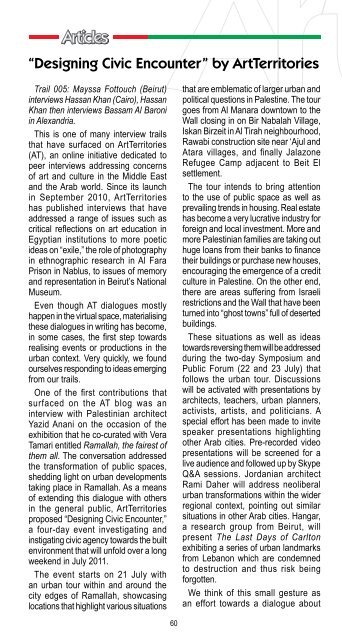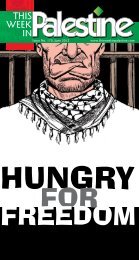Municipalities and Councils - Australians for Palestine
Municipalities and Councils - Australians for Palestine
Municipalities and Councils - Australians for Palestine
You also want an ePaper? Increase the reach of your titles
YUMPU automatically turns print PDFs into web optimized ePapers that Google loves.
“Designing Civic Encounter” by ArtTerritories<br />
Trail 005: Mayssa Fottouch (Beirut)<br />
interviews Hassan Khan (Cairo), Hassan<br />
Khan then interviews Bassam Al Baroni<br />
in Alex<strong>and</strong>ria.<br />
This is one of many interview trails<br />
that have surfaced on ArtTerritories<br />
(AT), an online initiative dedicated to<br />
peer interviews addressing concerns<br />
of art <strong>and</strong> culture in the Middle East<br />
<strong>and</strong> the Arab world. Since its launch<br />
in September 2010, ArtTerritories<br />
has published interviews that have<br />
addressed a range of issues such as<br />
critical reflections on art education in<br />
Egyptian institutions to more poetic<br />
ideas on “exile,” the role of photography<br />
in ethnographic research in Al Fara<br />
Prison in Nablus, to issues of memory<br />
<strong>and</strong> representation in Beirut’s National<br />
Museum.<br />
Even though AT dialogues mostly<br />
happen in the virtual space, materialising<br />
these dialogues in writing has become,<br />
in some cases, the first step towards<br />
realising events or productions in the<br />
urban context. Very quickly, we found<br />
ourselves responding to ideas emerging<br />
from our trails.<br />
One of the first contributions that<br />
surfaced on the AT blog was an<br />
interview with Palestinian architect<br />
Yazid Anani on the occasion of the<br />
exhibition that he co-curated with Vera<br />
Tamari entitled Ramallah, the fairest of<br />
them all. The conversation addressed<br />
the trans<strong>for</strong>mation of public spaces,<br />
shedding light on urban developments<br />
taking place in Ramallah. As a means<br />
of extending this dialogue with others<br />
in the general public, ArtTerritories<br />
proposed “Designing Civic Encounter,”<br />
a four-day event investigating <strong>and</strong><br />
instigating civic agency towards the built<br />
environment that will unfold over a long<br />
weekend in July 2011.<br />
The event starts on 21 July with<br />
an urban tour within <strong>and</strong> around the<br />
city edges of Ramallah, showcasing<br />
locations that highlight various situations<br />
60<br />
that are emblematic of larger urban <strong>and</strong><br />
political questions in <strong>Palestine</strong>. The tour<br />
goes from Al Manara downtown to the<br />
Wall closing in on Bir Nabalah Village,<br />
Iskan Birzeit in Al Tirah neighbourhood,<br />
Rawabi construction site near ‘Ajul <strong>and</strong><br />
Atara villages, <strong>and</strong> finally Jalazone<br />
Refugee Camp adjacent to Beit El<br />
settlement.<br />
The tour intends to bring attention<br />
to the use of public space as well as<br />
prevailing trends in housing. Real estate<br />
has become a very lucrative industry <strong>for</strong><br />
<strong>for</strong>eign <strong>and</strong> local investment. More <strong>and</strong><br />
more Palestinian families are taking out<br />
huge loans from their banks to finance<br />
their buildings or purchase new houses,<br />
encouraging the emergence of a credit<br />
culture in <strong>Palestine</strong>. On the other end,<br />
there are areas suffering from Israeli<br />
restrictions <strong>and</strong> the Wall that have been<br />
turned into “ghost towns” full of deserted<br />
buildings.<br />
These situations as well as ideas<br />
towards reversing them will be addressed<br />
during the two-day Symposium <strong>and</strong><br />
Public Forum (22 <strong>and</strong> 23 July) that<br />
follows the urban tour. Discussions<br />
will be activated with presentations by<br />
architects, teachers, urban planners,<br />
activists, artists, <strong>and</strong> politicians. A<br />
special ef<strong>for</strong>t has been made to invite<br />
speaker presentations highlighting<br />
other Arab cities. Pre-recorded video<br />
presentations will be screened <strong>for</strong> a<br />
live audience <strong>and</strong> followed up by Skype<br />
Q&A sessions. Jordanian architect<br />
Rami Daher will address neoliberal<br />
urban trans<strong>for</strong>mations within the wider<br />
regional context, pointing out similar<br />
situations in other Arab cities. Hangar,<br />
a research group from Beirut, will<br />
present The Last Days of Carlton<br />
exhibiting a series of urban l<strong>and</strong>marks<br />
from Lebanon which are condemned<br />
to destruction <strong>and</strong> thus risk being<br />
<strong>for</strong>gotten.<br />
We think of this small gesture as<br />
an ef<strong>for</strong>t towards a dialogue about<br />
<strong>Palestine</strong> that is engaged with<br />
neighbouring Arab cities, despite the<br />
deceptive distance that is imposed by<br />
travel restrictions resulting from the<br />
political situation.<br />
The event closes with a full-day<br />
workshop (24 July) with visionary<br />
social architect Teddy Cruz. Born in<br />
Guatemala, Cruz has been recognised<br />
internationally <strong>for</strong> his urban research<br />
on the Mexican/American border.<br />
Blurring the lines between architecture,<br />
activism, <strong>and</strong> art, he recently organised<br />
the latest programme of “Political<br />
Equator,” a bi-annual cross-border<br />
mobile meeting engaging in socioeconomic,<br />
urban, <strong>and</strong> environmental<br />
conditions along the Tijuana-San Diego<br />
border. The workshop is open to the<br />
general public <strong>and</strong> highly recommend<br />
to architects, artists, <strong>and</strong> social/urban<br />
activists.<br />
“Designing Civic Encounter” hopes<br />
to create an alternative public space<br />
<strong>for</strong> discussion, thus engendering more<br />
civic participation in a creative way.<br />
Programme<br />
Urban Bus Tour, 21 July, 10 a.m. to<br />
4:00 p.m.<br />
Departing from Riwaq<br />
Designing Civic Encounter<br />
Symposium <strong>and</strong> Public Forum: 22–23<br />
July, 9:30 a.m. to 5:00 p.m.<br />
Sharek Youth Forum<br />
Workshop with Teddy Cruz entitled<br />
“Diagramming Praxis: Where-Why-<br />
Who-What-How?” 24 July, 10:00 a.m.<br />
Sharek Youth Forum<br />
All events are free <strong>and</strong> open to the<br />
public. For reservations, please contact<br />
c.designingcivicencounter@gmail.com<br />
or phone 059-937-0860.<br />
ArtTerritories is co-founded by artists<br />
Shuruq Harb <strong>and</strong> Ursula Biemann.<br />
“Designing Civic Encounter” is an<br />
initiative by ArtTerritories sponsored by<br />
Rosa Luxemburg Foundation <strong>and</strong> Riwaq-<br />
Center. Visit www.artterritories.net <strong>for</strong><br />
more in<strong>for</strong>mation.<br />
61<br />
Burj Falastin. Photo by Ursula Biemann.<br />
Bir Nabala. Photo by Ursula Biemann.<br />
Urban Ramallah. Photos by Shuruq Harb (above <strong>and</strong> below).



